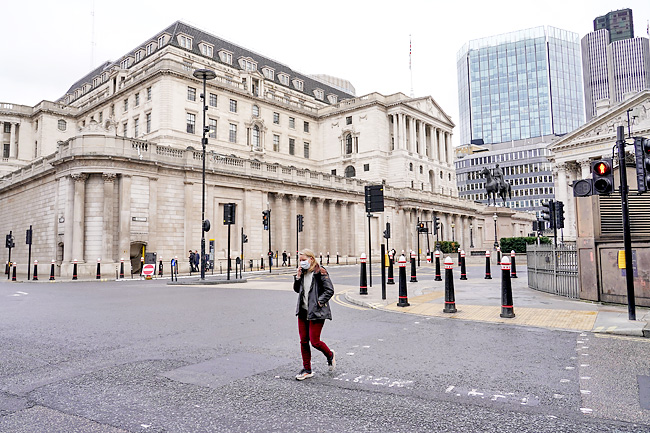LONDON (AP) – The Bank of England (BoE) was expected to raise interest rates again yesterday, putting the United Kingdom (UK) far ahead of the rest of Europe and the United States (US) in moving to tame surging inflation that is squeezing consumers and businesses.
Economists and investors forecast that the bank’s monetary policy committee will boost its key rate to 0.5 per cent, the second increase in three months. That may lead the bank to start reducing bond holdings that it has built up since the global financial crisis more than 10 years ago to stimulate economic growth.
The decision comes a week after the US Federal Reserve said it would end its own asset purchases in March and was likely to raise interest rates for the first time in more than three years. Monetary policymakers around the world are trying to contain inflation fuelled by rising energy prices and supply shortages as the global economy recovers from the COVID-19 pandemic.
In contrast, the European Central Bank (ECB) doesn’t plan to raise rates until 2023 despite record inflation, blaming it on temporary factors. But it has decided the economic recovery is strong enough for it to start carefully dialling back some of its stimulus efforts over the next year.
In the UK, consumer prices rose 5.4 per cent in the year through December, the highest inflation rate in almost 30 years. The squeeze is only going to get worse with household energy prices expected to jump by as much as 50 per cent in April and income taxes set to rise by 1.5 per cent the same month.

Investors now expect the BoE to raise its key rate three times this year, pushing the rate to one per cent by August.
The bank adjusts interest rates as it tries to keep the inflation rate below two per cent while also promoting economic growth.
Higher interest rates increase how much borrowers pay on everything from home mortgages to credit card purchases, reducing spending and slowing price increases. Lower rates tend to encourage spending and increase economic growth.
The BoE began buying UK government bonds and corporate bonds held by financial institutions in 2009 to pump money into the economy during the global financial crisis.
Policymakers were forced to turn to asset purchases after they had slashed interest rates to 0.5 per cent, limiting their ability to use interest rates to stimulate economic growth.



















































